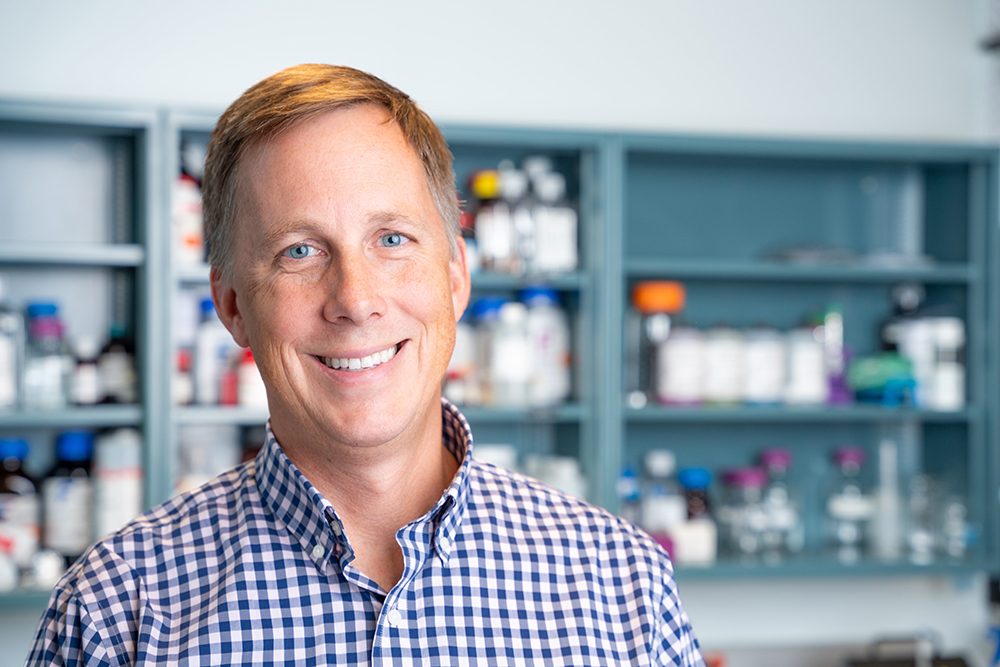Gaborski named department head for RIT Biomedical Engineering Department
Faculty-researcher in tissue engineering leads growing department
When Tom Gaborski began at RIT in the spring of 2012, he was the first permanent faculty member to join the new Biomedical Engineering program in the Kate Gleason College of Engineering. Over the years, he has taught four of the core courses in the curriculum as well as two different electives in tissue engineering, many of which he developed as the program grew. For the fall 2024 academic year, Gaborski has been appointed department head and will oversee a program that has expanded since it began to include more than 300 students in undergraduate, master’s and doctoral programs.
The professor, researcher, entrepreneur, and student-mentor brings expertise in materials engineering, biological separations, and the development of in vitro tissue barrier models. His research in these areas has become foundational for developing microphysiological systems, also known as tissue chips, which will advance and accelerate drug discovery and our understanding of human diseases, while simultaneously reducing and eliminating the need for animal testing.
“It has been exciting to watch the department grow and prosper. I am particularly impressed with our students and proud of what they have accomplished since they graduated from RIT. I served as the faculty advisor to all our first graduating students in 2015 and many of the class of 2016. Their accomplishments over the last decade as they’ve launched startup companies, been promoted to senior engineering roles and completed master’s and doctoral degrees in biomedical engineering, medicine and physical therapy, among other pursuits, is truly inspiring.” said Gaborski who has been recognized for excellence in teaching and honored with the 2024 RIT Trustees Scholarship Award.
Gaborski leads the NanoBio Materials Laboratory, comprised of a team of undergraduate and graduates students as well as postdoctoral researchers and technicians collaborating with other laboratories in a variety of research areas from nanomembrane technologies to solutions for degenerative disc disease and back pain. He is the inventor on several patents in nanobiotechnology and he and his laboratory have published more than 50 articles in peer-reviewed journals.
Gaborski’s research team at RIT has been supported by grants from the NIH and NSF as well as multiple corporate partnerships and the Hank and Lynn Hopeman foundation. He is also the co-founder of a local nanomaterials company, SiMPore, where he served as president before joining RIT in 2012. While Gaborski is no longer active in the day-to-day activities at SiMPore, SiMPore continues a strong collaborative relationship with RIT employing a number of co-op students and recent engineering graduates.
The college is also growing its nanotechnology facilities with a new life science focused wet lab space, the NanoBio Research Labs, across from the existing semiconductor clean room, complete with instrumentation facilities, microscopy, and dedicated cell culture rooms. This fall, the NanoBio Research Lab will open directory across the hall from the Semiconductor Nanofabrication Laboratory, formerly known as the Semiconductor and Microsystems Fabrication Laboratory. Gaborski’s team along with two colleagues in biomedical engineering, Vinay Abhyankar and Karin Wuertz, will be relocating their research laboratories to this new start-of-the-art space.
“I am excited to help our department continue to grow and support our students. I look forward to continuing to build strong ties with our alumni who are quickly becoming experts in all areas of biomedical engineering from industry to government to startups and global healthcare. Connecting our alumni with current students and with each other is one of my top priorities,” he said. This fall, the department launched its new biomedical engineering master’s degree, which focuses on the development of novel medical devices following a needs- and assessment-based approach.
Gaborski succeeds Steven Day, who held the department head position since 2015. He will return to teaching in the biomedical engineering program and continue research in the areas of biological fluid dynamics. Day has developed prosthetic heart valves and ventricular assistive devices, and his work in flow patterns has led to solutions that ensure blood and tissue damage is minimized when coming in contact with device mechanisms.




